#Databricks training
Explore tagged Tumblr posts
Text

Databricks Training
Master Databricks with AccentFuture! Learn data engineering, machine learning, and analytics using Apache Spark. Gain hands-on experience with labs, real-world projects, and expert guidance to accelerate your journey to data mastery.
0 notes
Text
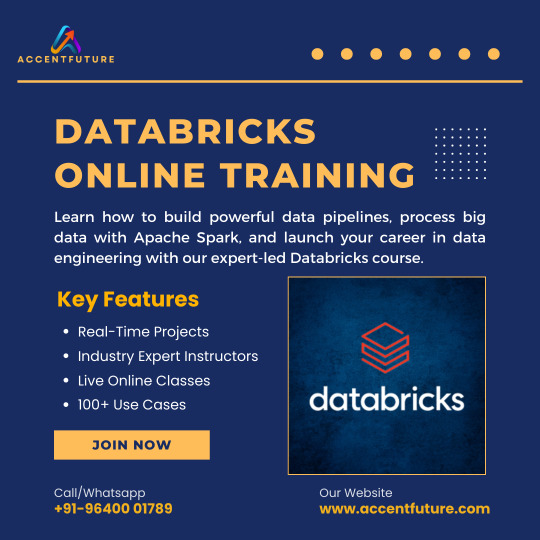
Master data analytics with our Databricks Training and become proficient in big data, Apache Spark, and machine learning. Join our Databricks Online Training for hands-on projects, expert guidance, and flexible learning ideal for beginners and professionals alike.
0 notes
Text
Navigating the Data Landscape: A Deep Dive into ScholarNest's Corporate Training

In the ever-evolving realm of data, mastering the intricacies of data engineering and PySpark is paramount for professionals seeking a competitive edge. ScholarNest's Corporate Training offers an immersive experience, providing a deep dive into the dynamic world of data engineering and PySpark.
Unlocking Data Engineering Excellence
Embark on a journey to become a proficient data engineer with ScholarNest's specialized courses. Our Data Engineering Certification program is meticulously crafted to equip you with the skills needed to design, build, and maintain scalable data systems. From understanding data architecture to implementing robust solutions, our curriculum covers the entire spectrum of data engineering.
Pioneering PySpark Proficiency
Navigate the complexities of data processing with PySpark, a powerful Apache Spark library. ScholarNest's PySpark course, hailed as one of the best online, caters to both beginners and advanced learners. Explore the full potential of PySpark through hands-on projects, gaining practical insights that can be applied directly in real-world scenarios.
Azure Databricks Mastery
As part of our commitment to offering the best, our courses delve into Azure Databricks learning. Azure Databricks, seamlessly integrated with Azure services, is a pivotal tool in the modern data landscape. ScholarNest ensures that you not only understand its functionalities but also leverage it effectively to solve complex data challenges.
Tailored for Corporate Success
ScholarNest's Corporate Training goes beyond generic courses. We tailor our programs to meet the specific needs of corporate environments, ensuring that the skills acquired align with industry demands. Whether you are aiming for data engineering excellence or mastering PySpark, our courses provide a roadmap for success.
Why Choose ScholarNest?
Best PySpark Course Online: Our PySpark courses are recognized for their quality and depth.
Expert Instructors: Learn from industry professionals with hands-on experience.
Comprehensive Curriculum: Covering everything from fundamentals to advanced techniques.
Real-world Application: Practical projects and case studies for hands-on experience.
Flexibility: Choose courses that suit your level, from beginner to advanced.
Navigate the data landscape with confidence through ScholarNest's Corporate Training. Enrol now to embark on a learning journey that not only enhances your skills but also propels your career forward in the rapidly evolving field of data engineering and PySpark.
#data engineering#pyspark#databricks#azure data engineer training#apache spark#databricks cloud#big data#dataanalytics#data engineer#pyspark course#databricks course training#pyspark training
3 notes
·
View notes
Text

Join our latest AWS Data Engineering demo and take your career to the next level!
Attend Online #FREEDEMO from Visualpath on # AWSDataEngineering by Mr.Chandra (Best Industry Expert).
Join Link: https://meet.goto.com/248120661
Free Demo on: 01/02/2025 @9:00AM IST
Contact us: +91 9989971070
Trainer Name: Mr Chandra
WhatsApp: https://www.whatsapp.com/catalog/919989971070/
Visit Blog: https://awsdataengineering1.blogspot.com/
Visit: https://www.visualpath.in/online-aws-data-engineering-course.html
#azuredataengineer#Visualpath#elearning#TechEducation#online#training#students#softwaredevelopment#trainingcourse#handsonlearning#DataFactory#DataBricks#DataLake#software#dataengineering#SynapseAnalytics#ApacheSpark#synapse#NewTechnology#TechSkills#ITSkills#ade#Azure#careergrowth
0 notes
Text
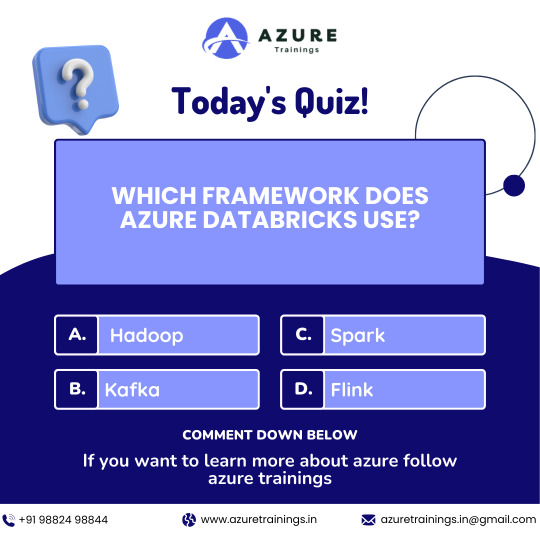
Quiz Time: Which framework does azure data bricks use?. comment your answer below!
To know more about frameworks and other topics in #azureadmin, #azuredevops, #azuredataengineer join in azure trainings
For more details contact
Phone:+91 9882498844
website: https://azuretrainings.in/
Email: [email protected]
0 notes
Text
[Fabric] Leer y escribir storage con Databricks
Muchos lanzamientos y herramientas dentro de una sola plataforma haciendo participar tanto usuarios técnicos (data engineers, data scientists o data analysts) como usuarios finales. Fabric trajo una unión de involucrados en un único espacio. Ahora bien, eso no significa que tengamos que usar todas pero todas pero todas las herramientas que nos presenta.
Si ya disponemos de un excelente proceso de limpieza, transformación o procesamiento de datos con el gran popular Databricks, podemos seguir usándolo.
En posts anteriores hemos hablado que Fabric nos viene a traer un alamacenamiento de lake de última generación con open data format. Esto significa que nos permite utilizar los más populares archivos de datos para almacenar y que su sistema de archivos trabaja con las convencionales estructuras open source. En otras palabras podemos conectarnos a nuestro storage desde herramientas que puedan leerlo. También hemos mostrado un poco de Fabric notebooks y como nos facilita la experiencia de desarrollo.
En este sencillo tip vamos a ver como leer y escribir, desde databricks, nuestro Fabric Lakehouse.
Para poder comunicarnos entre databricks y Fabric lo primero es crear un recurso AzureDatabricks Premium Tier. Lo segundo, asegurarnos de dos cosas en nuestro cluster:
Utilizar un policy "unrestricted" o "power user compute"
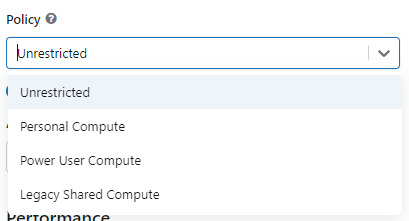
2. Asegurarse que databricks podría pasar nuestras credenciales por spark. Eso podemos activarlo en las opciones avanzadas

NOTA: No voy a entrar en más detalles de creación de cluster. El resto de las opciones de procesamiento les dejo que investiguen o estimo que ya conocen si están leyendo este post.
Ya creado nuestro cluster vamos a crear un notebook y comenzar a leer data en Fabric. Esto lo vamos a conseguir con el ABFS (Azure Bllob Fyle System) que es una dirección de formato abierto cuyo driver está incluido en Azure Databricks.
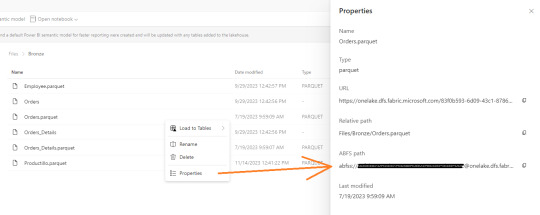
La dirección debe componerse de algo similar a la siguiente cadena:
oneLakePath = 'abfss://[email protected]/myLakehouse.lakehouse/Files/'
Conociendo dicha dirección ya podemos comenzar a trabajar como siempre. Veamos un simple notebook que para leer un archivo parquet en Lakehouse Fabric
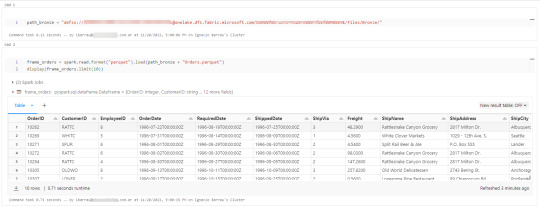
Gracias a la configuración del cluster, los procesos son tan simples como spark.read
Así de simple también será escribir.

Iniciando con una limpieza de columnas innecesarias y con un sencillo [frame].write ya tendremos la tabla en silver limpia.
Nos vamos a Fabric y podremos encontrarla en nuestro Lakehouse

Así concluye nuestro procesamiento de databricks en lakehouse de Fabric, pero no el artículo. Todavía no hablamos sobre el otro tipo de almacenamiento en el blog pero vamos a mencionar lo que pertine a ésta lectura.
Los Warehouses en Fabric también están constituidos con una estructura tradicional de lake de última generación. Su principal diferencia consiste en brindar una experiencia de usuario 100% basada en SQL como si estuvieramos trabajando en una base de datos. Sin embargo, por detras, podrémos encontrar delta como un spark catalog o metastore.

El path debería verse similar a esto:
path_dw = "abfss://[email protected]/WarehouseName.Datawarehouse/Tables/dbo/"
Teniendo en cuenta que Fabric busca tener contenido delta en su Spark Catalog de Lakehouse (tables) y en su Warehouse, vamos a leer como muestra el siguiente ejemplo

Ahora si concluye nuestro artículo mostrando como podemos utilizar Databricks para trabajar con los almacenamientos de Fabric.
#fabric#microsoftfabric#fabric cordoba#fabric jujuy#fabric argentina#fabric tips#fabric tutorial#fabric training#fabric databricks#databricks#azure databricks#pyspark
0 notes
Text


Skillup Yourself with #Azure #Power BI and #SQL
#azuretraining#azure data engineer course#azure data engineer training#azuredatafactory#azure data engineer online training#sqlschool#sql school training#azure databricks training#azure data engineer projects
0 notes
Text

Boost your career with AccentFuture's Databricks online training. Learn from industry experts, master real-time data analytics, and get hands-on experience with Databricks tools. Flexible learning, job-ready skills, and certification support included.
#course training#databricks online training#databricks training#databricks training course#learn databricks
0 notes
Text
#Apache Spark Databricks tutorial#Best data engineering tools 2025#Data engineering with Databricks#Databricks certification course#Databricks training#learn databricks in 2025#Learn Databricks online
0 notes
Text
From Beginner to Pro: The Best PySpark Courses Online from ScholarNest Technologies
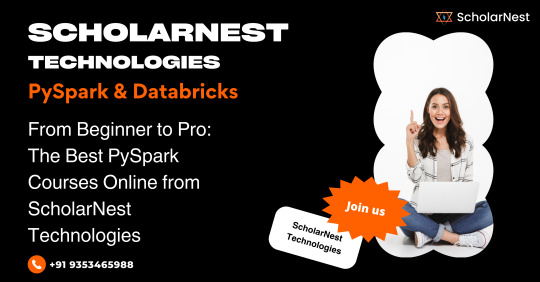
Are you ready to embark on a journey from a PySpark novice to a seasoned pro? Look no further! ScholarNest Technologies brings you a comprehensive array of PySpark courses designed to cater to every skill level. Let's delve into the key aspects that make these courses stand out:
1. What is PySpark?
Gain a fundamental understanding of PySpark, the powerful Python library for Apache Spark. Uncover the architecture and explore its diverse applications in the world of big data.
2. Learning PySpark by Example:
Experience is the best teacher! Our courses focus on hands-on examples, allowing you to apply your theoretical knowledge to real-world scenarios. Learn by doing and enhance your problem-solving skills.
3. PySpark Certification:
Elevate your career with our PySpark certification programs. Validate your expertise and showcase your proficiency in handling big data tasks using PySpark.
4. Structured Learning Paths:
Whether you're a beginner or seeking advanced concepts, our courses offer structured learning paths. Progress at your own pace, mastering each skill before moving on to the next level.
5. Specialization in Big Data Engineering:
Our certification course on big data engineering with PySpark provides in-depth insights into the intricacies of handling vast datasets. Acquire the skills needed for a successful career in big data.
6. Integration with Databricks:
Explore the integration of PySpark with Databricks, a cloud-based big data platform. Understand how these technologies synergize to provide scalable and efficient solutions.
7. Expert Instruction:
Learn from the best! Our courses are crafted by top-rated data science instructors, ensuring that you receive expert guidance throughout your learning journey.
8. Online Convenience:
Enroll in our online PySpark courses and access a wealth of knowledge from the comfort of your home. Flexible schedules and convenient online platforms make learning a breeze.
Whether you're a data science enthusiast, a budding analyst, or an experienced professional looking to upskill, ScholarNest's PySpark courses offer a pathway to success. Master the skills, earn certifications, and unlock new opportunities in the world of big data engineering!
#big data#data engineering#data engineering certification#data engineering course#databricks data engineer certification#pyspark course#databricks courses online#best pyspark course online#pyspark online course#databricks learning#data engineering courses in bangalore#data engineering courses in india#azure databricks learning#pyspark training course#pyspark certification course
1 note
·
View note
Text
What EDAV does:
Connects people with data faster. It does this in a few ways. EDAV:
Hosts tools that support the analytics work of over 3,500 people.
Stores data on a common platform that is accessible to CDC's data scientists and partners.
Simplifies complex data analysis steps.
Automates repeatable tasks, such as dashboard updates, freeing up staff time and resources.
Keeps data secure. Data represent people, and the privacy of people's information is critically important to CDC. EDAV is hosted on CDC's Cloud to ensure data are shared securely and that privacy is protected.
Saves time and money. EDAV services can quickly and easily scale up to meet surges in demand for data science and engineering tools, such as during a disease outbreak. The services can also scale down quickly, saving funds when demand decreases or an outbreak ends.
Trains CDC's staff on new tools. EDAV hosts a Data Academy that offers training designed to help our workforce build their data science skills, including self-paced courses in Power BI, R, Socrata, Tableau, Databricks, Azure Data Factory, and more.
Changes how CDC works. For the first time, EDAV offers CDC's experts a common set of tools that can be used for any disease or condition. It's ready to handle "big data," can bring in entirely new sources of data like social media feeds, and enables CDC's scientists to create interactive dashboards and apply technologies like artificial intelligence for deeper analysis.
4 notes
·
View notes
Text
Google Cloud’s BigQuery Autonomous Data To AI Platform
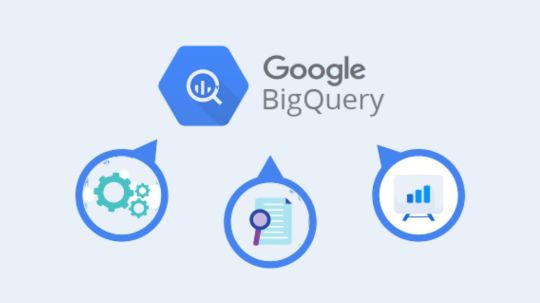
BigQuery automates data analysis, transformation, and insight generation using AI. AI and natural language interaction simplify difficult operations.
The fast-paced world needs data access and a real-time data activation flywheel. Artificial intelligence that integrates directly into the data environment and works with intelligent agents is emerging. These catalysts open doors and enable self-directed, rapid action, which is vital for success. This flywheel uses Google's Data & AI Cloud to activate data in real time. BigQuery has five times more organisations than the two leading cloud providers that just offer data science and data warehousing solutions due to this emphasis.
Examples of top companies:
With BigQuery, Radisson Hotel Group enhanced campaign productivity by 50% and revenue by over 20% by fine-tuning the Gemini model.
By connecting over 170 data sources with BigQuery, Gordon Food Service established a scalable, modern, AI-ready data architecture. This improved real-time response to critical business demands, enabled complete analytics, boosted client usage of their ordering systems, and offered staff rapid insights while cutting costs and boosting market share.
J.B. Hunt is revolutionising logistics for shippers and carriers by integrating Databricks into BigQuery.
General Mills saves over $100 million using BigQuery and Vertex AI to give workers secure access to LLMs for structured and unstructured data searches.
Google Cloud is unveiling many new features with its autonomous data to AI platform powered by BigQuery and Looker, a unified, trustworthy, and conversational BI platform:
New assistive and agentic experiences based on your trusted data and available through BigQuery and Looker will make data scientists, data engineers, analysts, and business users' jobs simpler and faster.
Advanced analytics and data science acceleration: Along with seamless integration with real-time and open-source technologies, BigQuery AI-assisted notebooks improve data science workflows and BigQuery AI Query Engine provides fresh insights.
Autonomous data foundation: BigQuery can collect, manage, and orchestrate any data with its new autonomous features, which include native support for unstructured data processing and open data formats like Iceberg.
Look at each change in detail.
User-specific agents
It believes everyone should have AI. BigQuery and Looker made AI-powered helpful experiences generally available, but Google Cloud now offers specialised agents for all data chores, such as:
Data engineering agents integrated with BigQuery pipelines help create data pipelines, convert and enhance data, discover anomalies, and automate metadata development. These agents provide trustworthy data and replace time-consuming and repetitive tasks, enhancing data team productivity. Data engineers traditionally spend hours cleaning, processing, and confirming data.
The data science agent in Google's Colab notebook enables model development at every step. Scalable training, intelligent model selection, automated feature engineering, and faster iteration are possible. This agent lets data science teams focus on complex methods rather than data and infrastructure.
Looker conversational analytics lets everyone utilise natural language with data. Expanded capabilities provided with DeepMind let all users understand the agent's actions and easily resolve misconceptions by undertaking advanced analysis and explaining its logic. Looker's semantic layer boosts accuracy by two-thirds. The agent understands business language like “revenue” and “segments” and can compute metrics in real time, ensuring trustworthy, accurate, and relevant results. An API for conversational analytics is also being introduced to help developers integrate it into processes and apps.
In the BigQuery autonomous data to AI platform, Google Cloud introduced the BigQuery knowledge engine to power assistive and agentic experiences. It models data associations, suggests business vocabulary words, and creates metadata instantaneously using Gemini's table descriptions, query histories, and schema connections. This knowledge engine grounds AI and agents in business context, enabling semantic search across BigQuery and AI-powered data insights.
All customers may access Gemini-powered agentic and assistive experiences in BigQuery and Looker without add-ons in the existing price model tiers!
Accelerating data science and advanced analytics
BigQuery autonomous data to AI platform is revolutionising data science and analytics by enabling new AI-driven data science experiences and engines to manage complex data and provide real-time analytics.
First, AI improves BigQuery notebooks. It adds intelligent SQL cells to your notebook that can merge data sources, comprehend data context, and make code-writing suggestions. It also uses native exploratory analysis and visualisation capabilities for data exploration and peer collaboration. Data scientists can also schedule analyses and update insights. Google Cloud also lets you construct laptop-driven, dynamic, user-friendly, interactive data apps to share insights across the organisation.
This enhanced notebook experience is complemented by the BigQuery AI query engine for AI-driven analytics. This engine lets data scientists easily manage organised and unstructured data and add real-world context—not simply retrieve it. BigQuery AI co-processes SQL and Gemini, adding runtime verbal comprehension, reasoning skills, and real-world knowledge. Their new engine processes unstructured photographs and matches them to your product catalogue. This engine supports several use cases, including model enhancement, sophisticated segmentation, and new insights.
Additionally, it provides users with the most cloud-optimized open-source environment. Google Cloud for Apache Kafka enables real-time data pipelines for event sourcing, model scoring, communications, and analytics in BigQuery for serverless Apache Spark execution. Customers have almost doubled their serverless Spark use in the last year, and Google Cloud has upgraded this engine to handle data 2.7 times faster.
BigQuery lets data scientists utilise SQL, Spark, or foundation models on Google's serverless and scalable architecture to innovate faster without the challenges of traditional infrastructure.
An independent data foundation throughout data lifetime
An independent data foundation created for modern data complexity supports its advanced analytics engines and specialised agents. BigQuery is transforming the environment by making unstructured data first-class citizens. New platform features, such as orchestration for a variety of data workloads, autonomous and invisible governance, and open formats for flexibility, ensure that your data is always ready for data science or artificial intelligence issues. It does this while giving the best cost and decreasing operational overhead.
For many companies, unstructured data is their biggest untapped potential. Even while structured data provides analytical avenues, unique ideas in text, audio, video, and photographs are often underutilised and discovered in siloed systems. BigQuery instantly tackles this issue by making unstructured data a first-class citizen using multimodal tables (preview), which integrate structured data with rich, complex data types for unified querying and storage.
Google Cloud's expanded BigQuery governance enables data stewards and professionals a single perspective to manage discovery, classification, curation, quality, usage, and sharing, including automatic cataloguing and metadata production, to efficiently manage this large data estate. BigQuery continuous queries use SQL to analyse and act on streaming data regardless of format, ensuring timely insights from all your data streams.
Customers utilise Google's AI models in BigQuery for multimodal analysis 16 times more than last year, driven by advanced support for structured and unstructured multimodal data. BigQuery with Vertex AI are 8–16 times cheaper than independent data warehouse and AI solutions.
Google Cloud maintains open ecology. BigQuery tables for Apache Iceberg combine BigQuery's performance and integrated capabilities with the flexibility of an open data lakehouse to link Iceberg data to SQL, Spark, AI, and third-party engines in an open and interoperable fashion. This service provides adaptive and autonomous table management, high-performance streaming, auto-AI-generated insights, practically infinite serverless scalability, and improved governance. Cloud storage enables fail-safe features and centralised fine-grained access control management in their managed solution.
Finaly, AI platform autonomous data optimises. Scaling resources, managing workloads, and ensuring cost-effectiveness are its competencies. The new BigQuery spend commit unifies spending throughout BigQuery platform and allows flexibility in shifting spend across streaming, governance, data processing engines, and more, making purchase easier.
Start your data and AI adventure with BigQuery data migration. Google Cloud wants to know how you innovate with data.
#technology#technews#govindhtech#news#technologynews#BigQuery autonomous data to AI platform#BigQuery#autonomous data to AI platform#BigQuery platform#autonomous data#BigQuery AI Query Engine
2 notes
·
View notes
Text
Master Big Data with a Comprehensive Databricks Course
A Databricks Course is the perfect way to master big data analytics and Apache Spark. Whether you are a beginner or an experienced professional, this course helps you build expertise in data engineering, AI-driven analytics, and cloud-based collaboration. You will learn how to work with Spark SQL, Delta Lake, and MLflow to process large datasets and create smart data solutions.
This Databricks Course provides hands-on training with real-world projects, allowing you to apply your knowledge effectively. Learn from industry experts who will guide you through data transformation, real-time streaming, and optimizing data workflows. The course also covers managing both structured and unstructured data, helping you make better data-driven decisions.
By enrolling in this Databricks Course, you will gain valuable skills that are highly sought after in the tech industry. Engage with specialists and improve your ability to handle big data analytics at scale. Whether you want to advance your career or stay ahead in the fast-growing data industry, this course equips you with the right tools.
🚀 Enroll now and start your journey toward mastering big data analytics with Databricks!
2 notes
·
View notes
Text
Azure Data Factory Training In Hyderabad
Key Features:
Hybrid Data Integration: Azure Data Factory supports hybrid data integration, allowing users to connect and integrate data from on-premises sources, cloud-based services, and various data stores. This flexibility is crucial for organizations with diverse data ecosystems.
Intuitive Visual Interface: The platform offers a user-friendly, visual interface for designing and managing data pipelines. Users can leverage a drag-and-drop interface to effortlessly create, monitor, and manage complex data workflows without the need for extensive coding expertise.

Data Movement and Transformation: Data movement is streamlined with Azure Data Factory, enabling the efficient transfer of data between various sources and destinations. Additionally, the platform provides a range of data transformation activities, such as cleansing, aggregation, and enrichment, ensuring that data is prepared and optimized for analysis.
Data Orchestration: Organizations can orchestrate complex workflows by chaining together multiple data pipelines, activities, and dependencies. This orchestration capability ensures that data processes are executed in a logical and efficient sequence, meeting business requirements and compliance standards.
Integration with Azure Services: Azure Data Factory seamlessly integrates with other Azure services, including Azure Synapse Analytics, Azure Databricks, Azure Machine Learning, and more. This integration enhances the platform's capabilities, allowing users to leverage additional tools and services to derive deeper insights from their data.
Monitoring and Management: Robust monitoring and management capabilities provide real-time insights into the performance and health of data pipelines. Users can track execution details, diagnose issues, and optimize workflows to enhance overall efficiency.
Security and Compliance: Azure Data Factory prioritizes security and compliance, implementing features such as Azure Active Directory integration, encryption at rest and in transit, and role-based access control. This ensures that sensitive data is handled securely and in accordance with regulatory requirements.
Scalability and Reliability: The platform is designed to scale horizontally, accommodating the growing needs of organizations as their data volumes increase. With built-in reliability features, Azure Data Factory ensures that data processes are executed consistently and without disruptions.
2 notes
·
View notes
Text
DOGE "engineers" are:
Akash Bobba: "investment engineering intern at the Bridgewater Associates hedge fund as of last spring, and previously an intern at both Meta and Palantir"
Edward Coristine: "appears to have recently graduated from high school and to have been enrolled at Northeastern University. According to a copy of his resume obtained by WIRED, he spent three months at Neuralink, Musk’s brain-computer interface company, last summer."
Luke Farritor: "former intern at SpaceX and currently a Thiel Fellow after, according to his LinkedIn, dropping out of the University of Nebraska-Lincoln. While in school, he was part of an award-winning team that deciphered portions of an ancient Greek scroll."
Gautier Cole Killian: "attended UC Berkeley until 2020; most recently, according to his LinkedIn, he worked for the AI company Databricks." Has a Substack.
Gavin Kliger: volunteer with DOGE, "attended McGill University through at least 2021 and graduated high school in 2019," former engineer at Jump Training.
Ethan Shaotran: "told Business Insider in September that he was a senior at Harvard studying computer science, and also the founder of an OpenAI-backed startup, Energize AI. Shaotran was the runner-up in a hackathon held by xAI, Musk’s AI company."

(BSky Post)
“WIRED has identified six young men—all apparently between the ages of 19 and 24, according to public databases, their online presences, and other records—who have little to no government experience and are now playing critical roles in Musk’s so-called Department of Government Efficiency (DOGE) project, tasked by executive order with “modernizing Federal technology and software to maximize governmental efficiency and productivity.” The engineers all hold nebulous job titles within DOGE, and at least one appears to be working as a volunteer. The engineers are Akash Bobba, Edward Coristine, Luke Farritor, Gautier Cole Killian, Gavin Kliger, and Ethan Shaotran. None have responded to requests for comment from WIRED. Representatives from OPM, GSA, and DOGE did not respond to requests for comment.”
—
The Young, Inexperienced Engineers Aiding Elon Musk’s Government Takeover
This is insane. These children can’t even rent a car.
Why aren’t Democrats at Defcon 1? Honestly. I don’t understand why this is happening and there isn’t a loud and forceful response from the opposition. Schumer is droning on about the price of tomatoes, while these unvetted kids are installing root kits, for fuck’s sake.
4K notes
·
View notes
Text
Unlocking the Power of Data: Why Kadel Labs Offers the Best Databricks Services and Consultants
In today’s rapidly evolving digital landscape, data is not just a byproduct of business operations—it is the foundation for strategic decision-making, innovation, and competitive advantage. Companies across the globe are leveraging advanced data platforms to transform raw data into actionable insights. One of the most powerful platforms enabling this transformation is Databricks, a cloud-based data engineering and analytics platform built on Apache Spark. However, to harness its full potential, organizations often require expert guidance and execution. This is where Kadel Labs steps in, offering the best Databricks consultants and top-tier Databricks services tailored to meet diverse business needs.
Understanding Databricks and Its Importance
Before diving into why Kadel Labs stands out, it’s important to understand what makes Databricks so valuable. Databricks combines the best of data engineering, machine learning, and data science into a unified analytics platform. It simplifies the process of building, training, and deploying AI and ML models, while also ensuring high scalability and performance.
The platform enables:
Seamless integration with multiple cloud providers (Azure, AWS, GCP)
Collaboration across data teams using notebooks and shared workspaces
Accelerated ETL processes through automated workflows
Real-time data analytics and business intelligence
Yet, while Databricks is powerful, unlocking its full value requires more than just a subscription—it demands expertise, vision, and customization. That’s where Kadel Labs truly shines.
Who Is Kadel Labs?
Kadel Labs is a technology consulting and solutions company specializing in data analytics, AI/ML, and digital transformation. With a strong commitment to innovation and a client-first philosophy, Kadel Labs has emerged as a trusted partner for businesses looking to leverage data as a strategic asset.
What sets Kadel Labs apart is its ability to deliver the best Databricks services, ensuring clients maximize ROI from their data infrastructure investments. From initial implementation to complex machine learning pipelines, Kadel Labs helps companies at every step of the data journey.
Why Kadel Labs Offers the Best Databricks Consultants
When it comes to data platform adoption and optimization, the right consultant can make or break a project. Kadel Labs boasts a team of highly skilled, certified, and experienced Databricks professionals who have worked across multiple industries—including finance, healthcare, e-commerce, and manufacturing.
1. Certified Expertise
Kadel Labs’ consultants hold various certifications directly from Databricks and other cloud providers. This ensures that they not only understand the technical nuances of the platform but also remain updated on the latest features, capabilities, and best practices.
2. Industry Experience
Experience matters. The consultants at Kadel Labs have hands-on experience with deploying large-scale Databricks environments for enterprise clients. This includes setting up data lakes, implementing Delta Lake, building ML workflows, and optimizing performance across various data pipelines.
3. Tailored Solutions
Rather than offering a one-size-fits-all approach, Kadel Labs customizes its Databricks services to align with each client’s specific business goals, data maturity, and regulatory requirements.
4. End-to-End Services
From assessment and strategy formulation to implementation and ongoing support, Kadel Labs offers comprehensive Databricks consulting services. This full lifecycle engagement ensures that clients get consistent value and minimal disruption.
Kadel Labs’ Core Databricks Services
Here’s an overview of why businesses consider Kadel Labs as the go-to provider for the best Databricks services:
1. Databricks Platform Implementation
Kadel Labs assists clients in setting up and configuring their Databricks environments across cloud platforms like Azure, AWS, and GCP. This includes provisioning clusters, configuring security roles, and ensuring seamless data integration.
2. Data Lake Architecture with Delta Lake
Modern data lakes need to be fast, reliable, and scalable. Kadel Labs leverages Delta Lake—Databricks’ open-source storage layer—to build high-performance data lakes that support ACID transactions and schema enforcement.
3. ETL and Data Engineering
ETL (Extract, Transform, Load) processes are at the heart of data analytics. Kadel Labs builds robust and scalable ETL pipelines using Apache Spark, streamlining data flow from various sources into Databricks.
4. Machine Learning & AI Integration
With an in-house team of data scientists and ML engineers, Kadel Labs helps clients build, train, and deploy machine learning models directly on the Databricks platform. The use of MLflow and AutoML accelerates time-to-value and model accuracy.
5. Real-time Analytics and BI Dashboards
Kadel Labs integrates Databricks with visualization tools like Power BI, Tableau, and Looker to create real-time dashboards that support faster and more informed business decisions.
6. Databricks Optimization and Support
Once the platform is operational, ongoing support and optimization are critical. Kadel Labs offers performance tuning, cost management, and troubleshooting to ensure that Databricks runs at peak efficiency.
Real-World Impact: Case Studies
Financial Services Firm Reduces Reporting Time by 70%
A leading financial services client partnered with Kadel Labs to modernize their data infrastructure using Databricks. By implementing a Delta Lake architecture and optimizing ETL workflows, the client reduced their report generation time from 10 hours to just under 3 hours.
Healthcare Provider Implements Predictive Analytics
Kadel Labs worked with a large healthcare organization to deploy a predictive analytics model using Databricks. The solution helped identify at-risk patients in real-time, improving early intervention strategies and patient outcomes.
The Kadel Labs Advantage
So what makes Kadel Labs the best Databricks consultants in the industry? It comes down to a few key differentiators:
Agile Methodology: Kadel Labs employs agile project management to ensure iterative progress, constant feedback, and faster results.
Cross-functional Teams: Their teams include not just data engineers, but also cloud architects, DevOps specialists, and domain experts.
Client-Centric Approach: Every engagement is structured around the client’s goals, timelines, and KPIs.
Scalability: Whether you're a startup or a Fortune 500 company, Kadel Labs scales its services to meet your data needs.
The Future of Data is Collaborative, Scalable, and Intelligent
As data becomes increasingly central to business strategy, the need for platforms like Databricks—and the consultants who can leverage them—will only grow. With emerging trends such as real-time analytics, generative AI, and data sharing across ecosystems, companies will need partners who can keep them ahead of the curve.
Kadel Labs is not just a service provider—it’s a strategic partner helping organizations turn data into a growth engine.
Final Thoughts
In a world where data is the new oil, harnessing it effectively requires not only the right tools but also the right people. Kadel Labs stands out by offering the best Databricks consultants and the best Databricks services, making it a trusted partner for organizations across industries. Whether you’re just beginning your data journey or looking to elevate your existing infrastructure, Kadel Labs provides the expertise, technology, and dedication to help you succeed.
If you’re ready to accelerate your data transformation, Kadel Labs is the partner you need to move forward with confidence.
0 notes